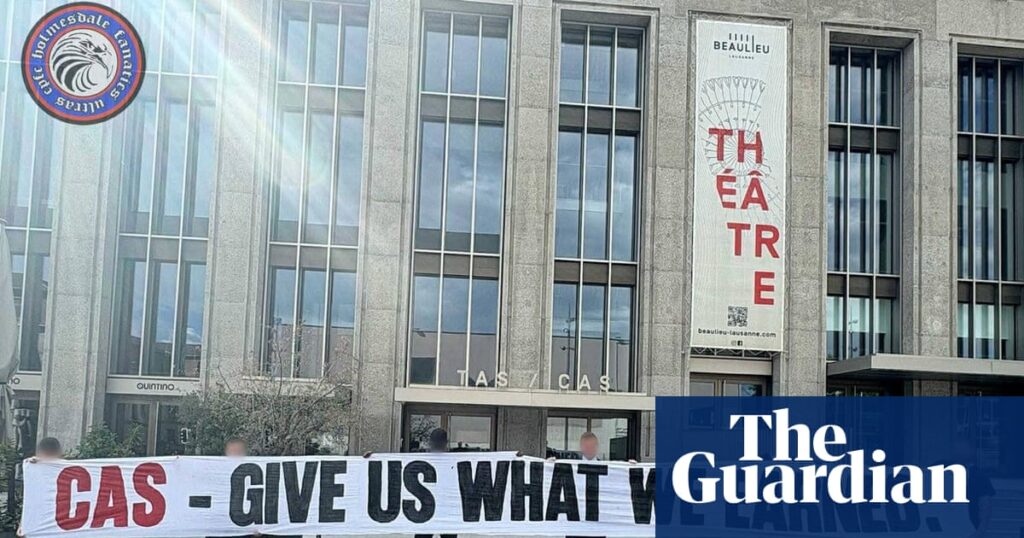When the Holmesdale Fanatics say they are planning something, it is usually worth paying attention. The receptionist at Uefa’s headquarters in Nyon looked bemused when presented with a suitcase full of fake bank notes last month by members of the Crystal Palace supporters’ group. They claimed it represented the “contradictions of their supposed ‘fundamental values’ of integrity and fairness and the reality of their business methods and general conduct”.
Uefa has said it followed the correct procedures after its club financial control body demoted Palace from the Europa League to the Conference League because they were deemed to have broken multi-club ownership rules. But for the HF, it was a call to arms.
“For a situation like this, where we and our family members feel there is something unjust happening to the club, we have to act quickly,” says Mickey Grafton, a founder member who also helped organise a protest outside Selhurst Park a week earlier attended by hundreds of fans.
An HF delegation, having also delivered a letter to Uefa’s president, Aleksander Ceferin, demanding the club’s reinstatement into the Europa League, headed to the headquarters of the court of arbitration for sport in Lausanne, where Palace’s appeal against their demotion will be heard on Friday. The result is due the following Monday. “The protests against those responsible will continue,” the HF said.
Palace have been drawn to play in the Conference League playoff round against the losers of the Europa League tie between Fredrikstad of Norway and Denmark’s Midtjylland, with the first leg scheduled for Selhurst Park on 21 August.
Officially formed in 2005, the HF has grown into one of most influential supporters’ groups in the country after playing a leading role in protests outside the headquarters of Lloyds Bank in 2010 when Palace were facing liquidation after being placed in administration.
The hand-painted tifos they produced for last season’s FA Cup semi-final against Aston Villa and the final against Manchester City – which it proudly emphasised involved at least 120 group members and were funded by fans – caught the eye of the wider football world. One depicted two young supporters celebrating a Darren Ambrose winner at Old Trafford in 2011 with their late father and the message: “Wembley will shake and it will be beautiful”.
Anyone who has attended a Palace game at Selhurst Park or on the road in recent years will attest to the frenzied atmosphere created by the black-shirted group, who are not afraid to do things differently and take their inspiration from Europe’s ‘Ultra’ culture.
“It’s a huge collective – that’s what English football has lacked if you compare it to the rest of the continent and beyond,” Grafton says. “It doesn’t have organised fan groups and as a result fans lose out. If you have organisation, you can have unity and through unity you can stop things like this happening. You can stop injustices and you can stand up for the values that made football so attractive to people. [If] constant profit and greed is pushed above all else then you end up in the state of the game in England today, which is not pretty.”
This takes a great deal of planning, with Grafton saying he and some of the group’s other main organisers are “very close to being sacked every day”. He says: “It comes at an expense. It becomes your life and you’re willing to do that for a football club because there are these values in modern life we think are worth preserving. They’re hard to find in modern life, let alone modern football.
after newsletter promotion
“We live in a individualistic infatuated modern world that’s materially rich and often quite socially poor. Themes like identity and belonging that so many people would find very normal around the world or in the past of this country are somewhat lacking. The football club and this group gives that in abundance. Those are partly our motivations.”
Previous HF banners have criticised the Premier League’s decision to permit Saudi Arabia’s Public Investment fund to buy a majority stake in Newcastle and taken aim at the increasing number of early kick-offs. They have also never been afraid to call out issues on their own doorstep. In January 2023, when the then co-owner John Textor completed his purchase of Lyon – a move that appears to have cost Palace their place in the Europa League – a banner said: “Multi-club ownership. Stock market gambling. Textor, we don’t trust you”.
“I would say that over the last 15 years, the Palace fanbase have gathered around issues of protest,” says Grafton. “The culture of Palace has changed. We’ve grown up with ideas about football as the group has grown. The social aspect around football is almost as important as football itself and if football loses that or it’s allowed to be discarded, then it’s just 11 blokes on each team kicking a ball around.”
There has been little sign of other Premier League clubs following the HF’s example although there is an emerging Ultras scene in Scotland. “English football culture is stagnating,” says Grafton. “There’s nothing happening on the terraces and there hasn’t been for 25 years. It’s time for change. But it has to be grassroots-led. Too many teams in the Premier League are imitating it from a boardroom level – a COO will give the green light to a printed banner that gets put in the ground for them to hold up. What we do is totally different.”

